NC State’s Summer Adventures
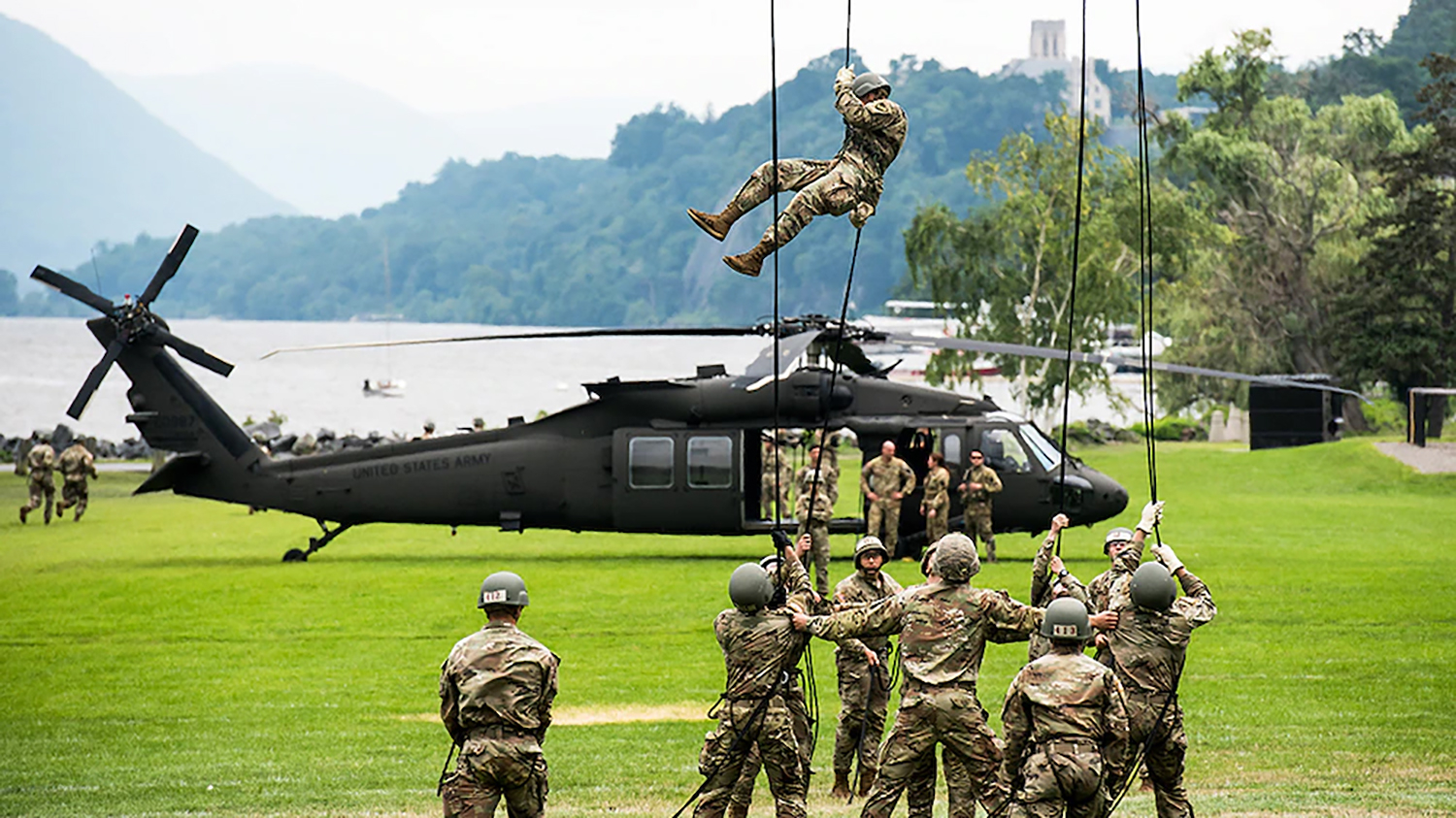
Making the most of summer means channeling a Think and Do attitude into new ways to create, serve and explore for NC State faculty, staff and students. Here members of the campus community share what they’ve been up to over the past few months and what they’ve learned from their experiences.
IR-4 Project
College of Agriculture and Life Sciences
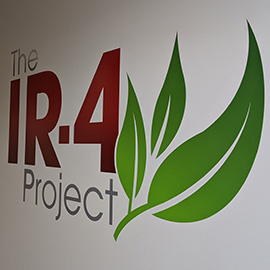 The IR-4 Project is wrapping up its move to NC State from Rutgers University this summer. The national organization, which facilitates research necessary for the approval of pest management technologies on specialty crops, started its transition to NC State in 2019. For IR-4, becoming part of the College of Agriculture and Life Sciences family was a natural fit with the college’s significant focus on plant protection and the numerous specialty crops grown in the state. Leadership is currently filling remaining positions at headquarters, and the last of the organization’s files were shipped to IR-4’s new office space on Centennial Campus in August, marking a significant milestone in the relocation of the organization’s headquarters. Approximately 25 employees will soon call NC State home once the transition is complete in the coming weeks.
The IR-4 Project is wrapping up its move to NC State from Rutgers University this summer. The national organization, which facilitates research necessary for the approval of pest management technologies on specialty crops, started its transition to NC State in 2019. For IR-4, becoming part of the College of Agriculture and Life Sciences family was a natural fit with the college’s significant focus on plant protection and the numerous specialty crops grown in the state. Leadership is currently filling remaining positions at headquarters, and the last of the organization’s files were shipped to IR-4’s new office space on Centennial Campus in August, marking a significant milestone in the relocation of the organization’s headquarters. Approximately 25 employees will soon call NC State home once the transition is complete in the coming weeks.
The IR-4 Project was established by the U.S. Department of Agriculture in 1963 to ensure that specialty crop growers have legal access to safe and effective crop protection products. With regional field offices throughout the country and a growing international footprint, IR-4 is able to protect crop yields from pests, reduce food waste and increase consumer access to healthy fruits, vegetables and ornamental crops.
NC State University Libraries Faculty
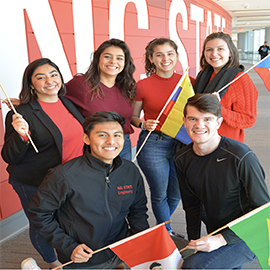 Over the summer a team of librarians worked with the pre-college program, CAMINOS, to do a presentation on being Latinx/Hispanic in higher education. CAMINOS is a summer preparation program for rising high school juniors and seniors that presents future scholars to opportunities within and around higher education while reinforcing cultural identity and community ties. While this year’s CAMINOS was virtual, there was a strong sense of community with over 50 students participating in the session. The librarians were able to showcase the various resources academic libraries provide students and use their special collections archive to bring historical context to the program.
Over the summer a team of librarians worked with the pre-college program, CAMINOS, to do a presentation on being Latinx/Hispanic in higher education. CAMINOS is a summer preparation program for rising high school juniors and seniors that presents future scholars to opportunities within and around higher education while reinforcing cultural identity and community ties. While this year’s CAMINOS was virtual, there was a strong sense of community with over 50 students participating in the session. The librarians were able to showcase the various resources academic libraries provide students and use their special collections archive to bring historical context to the program.
Kim Dick
Web Content Manager
Office of Research and Innovation
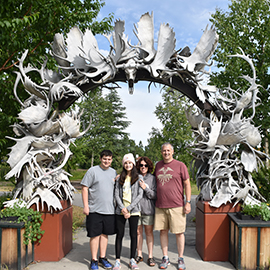 My family and I have dreamed of visiting all 50 states for quite a while. We had visited our 49th state the summer before the pandemic hit. We had yet to visit Alaska, but thankfully we were all able to get vaccinated and make the trip to the Last Frontier this summer. Our family visited Fairbanks, Anchorage, Homer, Seward, Talkeetna and Denali. We rented a car and drove over 2,000 miles. We saw beautiful glaciers, mountains, glacier lakes, and bays, as well as grizzly bears, whales, moose and sled dogs. It was a particularly meaningful trip because my oldest child starts college this fall. Visiting Alaska was a grand finale to our adventures across all 50 states. We are very much looking forward to our future adventures.
My family and I have dreamed of visiting all 50 states for quite a while. We had visited our 49th state the summer before the pandemic hit. We had yet to visit Alaska, but thankfully we were all able to get vaccinated and make the trip to the Last Frontier this summer. Our family visited Fairbanks, Anchorage, Homer, Seward, Talkeetna and Denali. We rented a car and drove over 2,000 miles. We saw beautiful glaciers, mountains, glacier lakes, and bays, as well as grizzly bears, whales, moose and sled dogs. It was a particularly meaningful trip because my oldest child starts college this fall. Visiting Alaska was a grand finale to our adventures across all 50 states. We are very much looking forward to our future adventures.
Jacob Duncan
Senior, Biological Sciences, College of Sciences
Army ROTC Cadet
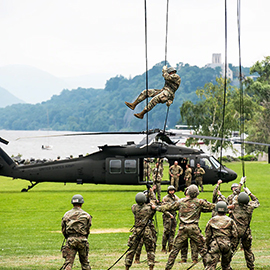 This summer, I had the opportunity to attend the United States Army Air Assault School and the United States Army Cadet Command Cadet Summer Training Advanced Camp. The United States Army Air Assault School is a 10-day course that trains and certifies Army soldiers to conduct Army rotary-wing missions in support of a wide range of military operations including humanitarian assistance and combat operations. The 10-day course consists of rotary-wing aircraft familiarization, sling load operations (utilizing helicopters to transport vehicles and equipment), and soldier rappel operations. Air Assault school is held at three different locations each year, and I had the privilege of completing it at the United States Military Academy, West Point in New York. After graduating from Air Assault, I traveled to Fort Knox, Kentucky to complete Advanced Camp.
This summer, I had the opportunity to attend the United States Army Air Assault School and the United States Army Cadet Command Cadet Summer Training Advanced Camp. The United States Army Air Assault School is a 10-day course that trains and certifies Army soldiers to conduct Army rotary-wing missions in support of a wide range of military operations including humanitarian assistance and combat operations. The 10-day course consists of rotary-wing aircraft familiarization, sling load operations (utilizing helicopters to transport vehicles and equipment), and soldier rappel operations. Air Assault school is held at three different locations each year, and I had the privilege of completing it at the United States Military Academy, West Point in New York. After graduating from Air Assault, I traveled to Fort Knox, Kentucky to complete Advanced Camp.
Advanced Camp is the seminal training event for an ROTC cadet, where every cadet scheduled to commission as a Second Lieutenant in the United States Army in the summer of 2022 must complete a 39-day rigorous training evolution. I faced a number of challenges, both physical and mental, as I demonstrated the ability to lead my peers in a variety of tasks and training scenarios. Each day required critical thinking, the ability to problem-solve, and teamwork. I was more than prepared and credit my readiness to the leadership and training the North Carolina Army ROTC program has provided me over the past three years. I’m grateful to soon have the opportunity to serve the nation as a commissioned officer in the U.S. Army. Thanks to Army ROTC for the opportunity to become a leader and for helping me through my academic pursuits for a Bachelor of Science in biology along the way – GO PACK!
Stacy Gant
Interim Senior Director
DELTA
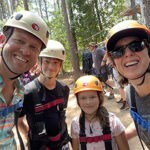 This summer, the Gant family experienced high adventure (literally) at the US Whitewater Center in Charlotte. We went whitewater rafting, rock climbing, and ziplining. In the attached photo, we are about to ascend the tower on Hawk Island and ride the zipline called “Double Down.” Pictured left to right: Jed, Oliver (12), Nora (8), and Stacy.
This summer, the Gant family experienced high adventure (literally) at the US Whitewater Center in Charlotte. We went whitewater rafting, rock climbing, and ziplining. In the attached photo, we are about to ascend the tower on Hawk Island and ride the zipline called “Double Down.” Pictured left to right: Jed, Oliver (12), Nora (8), and Stacy.
Jennifer Landin
Associate Professor of Teaching
Department of Biological Sciences, College of Sciences
 I received a small grant from the BW Wells Stewardship Fund and NC Native Plant Society to build and stock two benches full of native, pollinator-friendly seeds and supplies. Over the past six weeks, I’ve dispensed over 250 packets of seeds in local parks and am now working with the Town of Cary to continue this effort. Student Lucie Ciccone, a senior zoology major, helped me build and paint the benches.
I received a small grant from the BW Wells Stewardship Fund and NC Native Plant Society to build and stock two benches full of native, pollinator-friendly seeds and supplies. Over the past six weeks, I’ve dispensed over 250 packets of seeds in local parks and am now working with the Town of Cary to continue this effort. Student Lucie Ciccone, a senior zoology major, helped me build and paint the benches.
Cara Lewis
Marketing and Communications Specialist, Department of Parks, Recreation and Tourism Management
College of Natural Resources
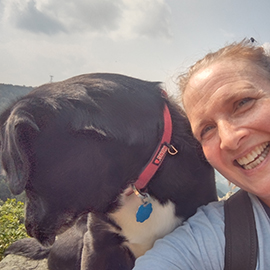 Hired during the pandemic, I was one of many who sought regular refuge in public parks and green spaces to deal with social isolation and “Zoomlash”. This summer I took the opportunity to take myself and my loyal co-pilot, Luther (a certified therapy dog) on a vacation to the North Carolina mountains. Just the two of us. In short, this recharge and respite was exactly what I needed and I intend to make solo trips a regular thing.
Hired during the pandemic, I was one of many who sought regular refuge in public parks and green spaces to deal with social isolation and “Zoomlash”. This summer I took the opportunity to take myself and my loyal co-pilot, Luther (a certified therapy dog) on a vacation to the North Carolina mountains. Just the two of us. In short, this recharge and respite was exactly what I needed and I intend to make solo trips a regular thing.
A working parent of two, I was thrilled when I learned 4-H camps would be open this summer with stringent safety requirements. Once I signed my kids up in March, I promised myself that I’d book a solo vacation the same week. Well, time went by. I didn’t solidify my plans till about three days before I’d be taking my kids to Betsy-Jeff Penn 4-H camp in Reidsville. A few late nights with the internet and I found a tiny cabin near Mount Jefferson.
I spent my week hiking with Luther, visiting local breweries, sampling Ashe County cheese and reading. The only structure I had during my solo trip involved keeping up with PRT 200: The Pursuit of Health, Wellness and Happiness. As an employee, I’ve been keen to take a class and use my tuition waiver. I’m so glad I did. The content and timing of this class was profound and I’d recommend it to any college student and life-long learner.
Linnea Linton
Associate Director, Joint NC State/UNC-Asheville Engineering Programs
Engineering Online
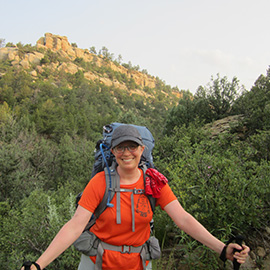 My summer plans put me way outside my comfort zone. I spent 12 days backpacking with the Scouts BSA at Philmont Scout Ranch in the high country of New Mexico. My husband and both of our sons were going, and the crew needed a second adult female to help with the girls in the crew, so I agreed to go. We hiked around 60 miles total and got to see archaeological sites, learned to throw atlatls and tomahawks, shot 12-gauge shotguns and bows and arrows, did blacksmithing, helped build an actual railroad, rode horses, traveled with a burro, summited Baldy Mountain at 12,441 ft elevation, and by nature of the beast, learned to treat serious blisters. It was an amazing experience. Prior to this, I had been backpacking for two nights in a row at the longest. We trained for about a year and our crew did great! I can’t wait to go backpacking again, once my feet have fully recovered!
My summer plans put me way outside my comfort zone. I spent 12 days backpacking with the Scouts BSA at Philmont Scout Ranch in the high country of New Mexico. My husband and both of our sons were going, and the crew needed a second adult female to help with the girls in the crew, so I agreed to go. We hiked around 60 miles total and got to see archaeological sites, learned to throw atlatls and tomahawks, shot 12-gauge shotguns and bows and arrows, did blacksmithing, helped build an actual railroad, rode horses, traveled with a burro, summited Baldy Mountain at 12,441 ft elevation, and by nature of the beast, learned to treat serious blisters. It was an amazing experience. Prior to this, I had been backpacking for two nights in a row at the longest. We trained for about a year and our crew did great! I can’t wait to go backpacking again, once my feet have fully recovered!
Eric Miller
Professor, Department of Plant and Microbial Biology
College of Agriculture and Life Sciences
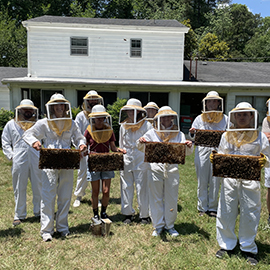 In late May, the buzz about campus was that we were heading into more normal sessions of classes, research and other on-campus activities. Thus, our USDA NIFA-funded Research and Extension Experience for Undergraduates (REEU) program, BeeMORE: Bees and Microbes in Organized Research and Extension, got off to a great start. After COVID-19 cancelled the program last summer, a cohort of 10 (+1 remote) students arrived on campus from locales across the country — Alabama, Colorado, Wisconsin, New York, North Carolina, Pennsylvania and Puerto Rico to engage with NC State faculty.
In late May, the buzz about campus was that we were heading into more normal sessions of classes, research and other on-campus activities. Thus, our USDA NIFA-funded Research and Extension Experience for Undergraduates (REEU) program, BeeMORE: Bees and Microbes in Organized Research and Extension, got off to a great start. After COVID-19 cancelled the program last summer, a cohort of 10 (+1 remote) students arrived on campus from locales across the country — Alabama, Colorado, Wisconsin, New York, North Carolina, Pennsylvania and Puerto Rico to engage with NC State faculty.
Projects involved honey bee pathogens, bumble bee microbes, plant products affecting bees, and yeast metabolic products, to name a few. In addition to trips visiting local biotech company AgBiome, attending a western North Carolina beekeepers meeting, engaging with campus extension personnel, presenting at the Summer Science and Creativity Symposium, BeeMORE students found ways to enjoy Raleigh and the geography of North Carolina. One could hear students chatting about glamping, surfing, food halls and movie nights. What’s not to like? Bees, microbes and more! The program has been re-funded for the next five years, with new discoveries and adventures yet to come.
Dan Monek
Professor and Department Head, Department of Music
Division of Academic and Student Affairs
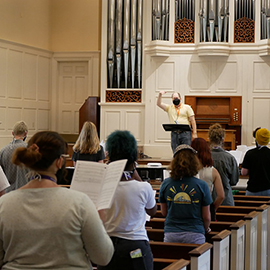 This summer I had the opportunity to work with gifted and talented vocal music students from across North Carolina as a part of the Department of Public Instruction’s Governor’s School program, a five-week intensive residential program that integrates a number of academic disciplines including the arts and is the nation’s oldest statewide summer residential program for gifted high school students. Students are selected to attend through a competitive audition process after being nominated by their public school unit or non-public school. Working through a variety of COVID-mitigation protocols, we explored and performed a large variety of advanced contemporary choral music at the school’s east campus (held at Meredith College). It was an honor to be able to finally return to live music making with such an exceptional group of high school student-musicians.
This summer I had the opportunity to work with gifted and talented vocal music students from across North Carolina as a part of the Department of Public Instruction’s Governor’s School program, a five-week intensive residential program that integrates a number of academic disciplines including the arts and is the nation’s oldest statewide summer residential program for gifted high school students. Students are selected to attend through a competitive audition process after being nominated by their public school unit or non-public school. Working through a variety of COVID-mitigation protocols, we explored and performed a large variety of advanced contemporary choral music at the school’s east campus (held at Meredith College). It was an honor to be able to finally return to live music making with such an exceptional group of high school student-musicians.
Latasia Priest
Associate Director of Development, North Carolina Textile Foundation
Wilson College of Textiles
 In July 2020, Donnell and I were supposed to travel to Paris and London and, of course, we weren’t able to go. Randomly, I had the idea that since we couldn’t go to France, why not bring France to us? The previous year we participated in Diner en Blanc (DEB) and absolutely loved the experience. I thought I would use my planning for DEB as a “template” and duplicate that experience. I took the week to research authentic French recipes to cook as well as French jazz artists to provide a full experience. I made everything from scratch (yes, the macarons, too!), and it was amazing. We sat outside, ate and talked for nearly four hours. It was a much-needed change to the monotony of our COVID days.
In July 2020, Donnell and I were supposed to travel to Paris and London and, of course, we weren’t able to go. Randomly, I had the idea that since we couldn’t go to France, why not bring France to us? The previous year we participated in Diner en Blanc (DEB) and absolutely loved the experience. I thought I would use my planning for DEB as a “template” and duplicate that experience. I took the week to research authentic French recipes to cook as well as French jazz artists to provide a full experience. I made everything from scratch (yes, the macarons, too!), and it was amazing. We sat outside, ate and talked for nearly four hours. It was a much-needed change to the monotony of our COVID days.
We really enjoyed this way of learning about other countries and cultures, so we decided to continue our dinners every two weeks. This summer, we celebrated one year of Around the World in Quarantine and a grand total of 27 dinners. You can view our Around the World in Quarantine journey at https://perfectlypriest.com/around-the-world-in-quarantine/.
Kimberly M. Zak
HR Specialist
Department of Materials Science and Engineering, College of Engineering
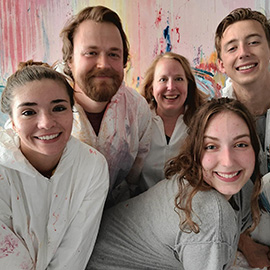 My daughter, Annissa Zak, is a muralist in Chicago and has her own art studio. This May when we were in Chicago, we had a paint party in her studio for her birthday. Annissa made sure to wrap us up in disposable coveralls as we threw paint balloons on a freshly painted white wall in her studio. Lots of laughs as we made such a mess!
My daughter, Annissa Zak, is a muralist in Chicago and has her own art studio. This May when we were in Chicago, we had a paint party in her studio for her birthday. Annissa made sure to wrap us up in disposable coveralls as we threw paint balloons on a freshly painted white wall in her studio. Lots of laughs as we made such a mess!
This post was originally published in Provost's Office News.